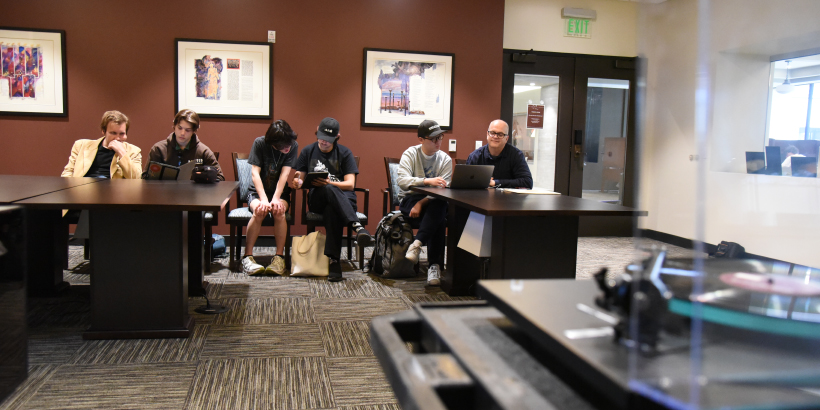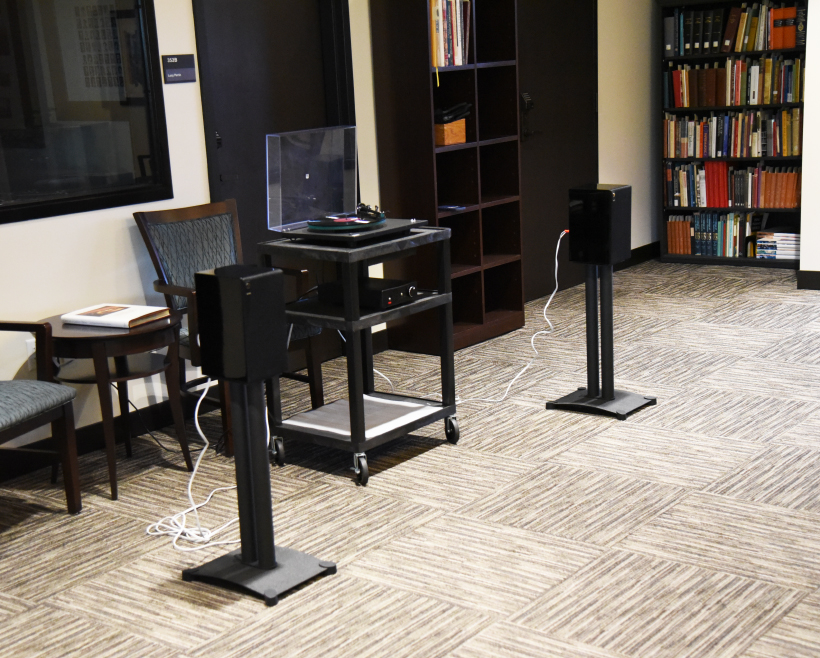Professor of Music Partners with Pepperdine Libraries to Offer Unique Learning Experience

During the spring 2025 semester, professor of music Lincoln Hanks partnered with Pepperdine Libraries’ Special Collections and Archives to offer a unique learning experience for students enrolled in his Music Composition Seminar (MUS 103) course. Each week, students listened to a record—in its entirety—in the Special Collections Reading Room. Dr. Hanks conceived the course around the concepts of long-form listening, deep listening, and developing an appreciation for the art and intention behind an entire music album.
Dr. Hanks explained that students tend to listen passively from streaming platforms and that many don't have the time to listen to an album from beginning to end. He wanted students to experience music in a more intentional and immersive way, engaging it from multiple angles, including following the development of a melody, attending to orchestration and tone color, allowing imagery and emotion to emerge, and tracing the formal structure of a piece.
“As their listening deepens, students learn to explore the surrounding context of the performance: the acoustic space, microphone placement, recording quality, and even background noise. They compare different interpretations of the same piece, sharpening their critical ears and artistic judgment. Ultimately, the goal is to move from passive hearing to active, reflective listening—an essential skill for musicians and music lovers alike,” he stated.
While the Special Collections Reading Room was not originally designed for deep listening, Dr. Hanks transformed it into one each time the class met. With the support of Pepperdine Libraries archivist Christopher Miehl, a high-quality LP player was set up and carefully positioned to ensure an optimal stereo image. Dr. Hanks cleaned the selected record using the library’s professional-grade disc washer before placing it on the turntable. The room was quiet and free from distractions, and for one day each week, it became a space devoted solely to one purpose: deep, immersive listening.
But why the vinyl record over other forms of media? Dr. Hanks shared that the LP, or the long-playing record, is a vital art form that defined much of the 20th century. Records were thoughtfully curated music collections and included rich, scholarly liner notes that provided context about the composers, performers, recording techniques, and the overall artistic vision behind the album.
Dr. Hanks remarked, “This depth of presentation offers valuable lessons for our student musicians—especially aspiring composers—who will someday be responsible for curating concert programs of their own music or that of others. They may have to select and order the repertoire that makes sense for the flow of the program, and they will often have to write program notes. Studying well-crafted albums can provide critical insights into programming flow, conceptual cohesion, and listener engagement.”
Dr. Hanks recognized how Pepperdine Libraries positively impacts his students’ learning. “We greatly value the library’s collection of music scores and have made them an important part of our deep listening practice.”
